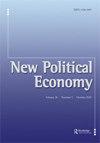国家金融化的限制:探讨英国、以色列和加拿大将社会影响力债券作为金融化治国之道的障碍
IF 3.8
2区 经济学
Q1 ECONOMICS
引用次数: 1
摘要
摘要在金融化文献中,学者们将注意力转向了国家,探索国家行为者对金融活动的采用,而较少关注国家金融化的局限性。本文以社会影响债券(SIBs)为例探讨了这些限制。SIBs于2010年在英国率先推出,随后在约35个国家进行了试验,它利用私人资本为社会项目提供资金,政府根据成功程度提供回报。尽管预计会出现大幅增长,但SIB模式从未真正站稳脚跟。基于系统重要性银行在英国、以色列和加拿大的推出,本文将系统重要性银行企业所面临的挑战视为一种金融化治国方略,并确定了三个障碍:(1)对国家金融化政治议程的抵制;(2) 金融和公共部门文化之间的冲突;(3) 金融创新被视为对根深蒂固的社会技术惯例的“风险”和“破坏”。这些障碍揭示了国家内部以及金融和公共部门之间的紧张关系,并表明了思考国家金融化的局限性和失败的重要性。本文章由计算机程序翻译,如有差异,请以英文原文为准。
Limits to the financialisation of the state: exploring obstructions to social impact bonds as a form of financialised statecraft in the UK, Israel, and Canada
ABSTRACT Within the financialisation literature, scholars have turned their attention to the state, exploring the adoption of financial activities by state actors, paying less attention to the limits of state financialisation. This paper explores these limits using the case of social impact bonds (SIBs). Pioneered in the UK in 2010 and subsequently trialed in some 35 countries, SIBs use private capital to fund social programs, with governments providing a return based on the degree of success. Despite expectations of dramatic growth, the SIB model has never truly taken hold. Based on the rollout of SIBs in the UK, Israel, and Canada, the paper considers the challenges encountered by the SIB enterprise as a form of financialised statecraft and identifies three barriers: (1) resistance to political agendas of state financialisation; (2) clashes between finance and public sector cultures; (3) financial innovation seen as ‘risk’ and ‘disruption’ to entrenched socio-technical routines. These barriers reveal tensions both within the state itself and between finance and the public sector, and indicate the importance of thinking about the limits and failures of state financialisation.
求助全文
通过发布文献求助,成功后即可免费获取论文全文。
去求助
来源期刊

New Political Economy
Multiple-
CiteScore
10.10
自引率
9.50%
发文量
41
期刊介绍:
New Political Economy aims to create a forum for work which combines the breadth of vision which characterised the classical political economy of the nineteenth century with the analytical advances of twentieth century social science. It seeks to represent the terrain of political economy scholarship across different disciplines, emphasising original and innovative work which explores new approaches and methodologies, and addresses core debates and issues of historical and contemporary relevance.
 求助内容:
求助内容: 应助结果提醒方式:
应助结果提醒方式:


